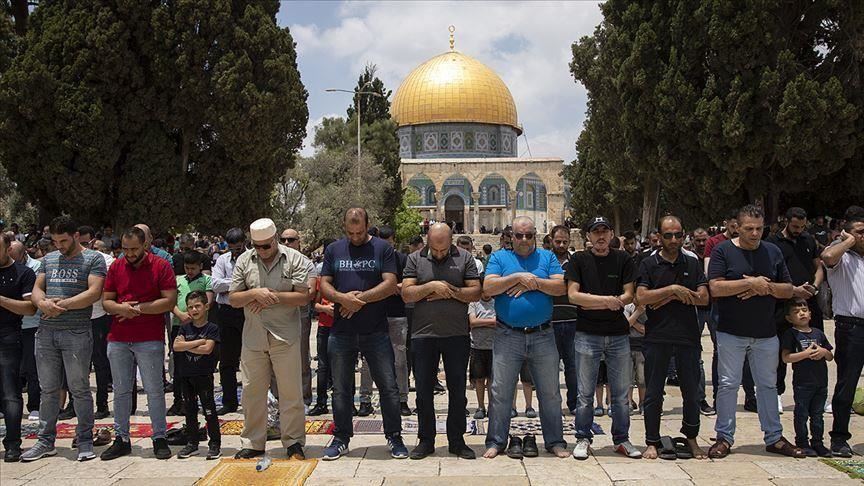Fires still engulfing Al-Aqsa Mosque: Palestinians
Arson attack on Al-Aqsa mosque was one of several assaults on site since Israel occupied Jerusalem in 1967
 FILE PHOTO
FILE PHOTO
JERUSALEM
Although 50 years have passed since extremist Australian tourist Denis Michael Rohan set fire to East Jerusalem's Al-Aqsa mosque, Palestinians say the flames are still engulfing the flashpoint site.
The 1969 fire has destroyed nearly third of the al-Qiblah mosque, including the 1,000-year old priceless wood and ivory pulpit of conqueror Saladin.
The blaze also destroyed the mihrab (prayer niche) of Muslim caliph Omar bin al-Khattab, the decorated interior and the gilded wooden dome.
"Muslims around the world still remember the horrific fire of Al-Aqsa mosque by criminal (Denis Michael Rohan) and other criminals, who were not revealed," the Islamic Supreme Committee in Jerusalem said in a statement on Wednesday.
The committee held Israel, which has occupied the West Bank, where the Al-Aqsa Mosque in located, in 1967, for the fire.
"Fires are still engulfing in Al-Aqsa in the form of racist incursions by extremist Jewish groups backed by the Israeli government and army and the excavations that threaten the foundations of the mosque," it said.
In response to the arson attack, Islamic countries founded the umbrella Organization of the Islamic Conference, now the Organization of Islamic Cooperation (OIC), during their summit in Morocco which was convened a month after the attack.
On September 15, 1969, the United Nations Security Council adopted resolution 271, which grieved at the extensive damage caused by the fire and condemned Israel for failing to respect UN resolutions.
Rohan was arrested two days after the arson attack. Israeli authorities said that he was suffering from severe mental illness and later expelled him to Australia.
For Muslims, Al-Aqsa represents the world's third holiest site. Jews, for their part, refer to the area as the "Temple Mount," claiming it was the site of two Jewish temples in ancient times.
Threats, assaults
The Jordan-run Administration of Jerusalem's Awqaf and Al-Aqsa Mosque Affairs said Israeli excavations are posing a major threat to the holy site.
"The Al-Aqsa mosque is facing increasing threats, fifty years after the arson attack," the administration said in a statement.
It cited underground tunnels dug by Israeli authorities in Jerusalem's Old City as among threats to the holy site.
"Settlement blocs built by the [Israeli] occupation all across Jerusalem are also threatening the Arab and Islamic presence in the city," it said.
"Synagogues built or being built by Israel also target the Arab and Islamic presence in the city and aim to prevent Muslims from reaching the mosque," the statement warned.
The administration went on to accuse Israel of "deliberately blocking the necessary restoration works in the mosque".
The arson attack was one of several assaults on the flashpoint site since Israel’s occupation of East Jerusalem in 1967.
In April 1982, an Israeli soldier indiscriminately opened fire on worshipers inside the mosque, killing two and wounding six others.
In October of 1990, Israeli police killed 21 Palestinians and injured scores during clashes that erupted when Jewish extremists tried to place the foundation stone of a Jewish temple inside the mosque.
Israeli authorities, meanwhile, have carried out "archaeological" work in the vicinity of the mosque without disclosing the exact nature or details of these excavations.
Palestinian anger at the excavations reached a fever pitch in September 1996, when the Israeli government opened a tunnel under Al-Aqsa mosque’s western wall.
The Israeli move invited Palestinian fury, sparking days of demonstrations across Israeli-occupied territories, during which 63 Palestinians were killed and hundreds injured.
In September 2000, a visit to Al-Aqsa by controversial Israeli politician Ariel Sharon sparked what later became known as the "Second Intifada," a popular uprising against the Israeli occupation in which thousands of Palestinians were killed.
*Bassel Barakat contributed to this report from Ankara
Anadolu Agency website contains only a portion of the news stories offered to subscribers in the AA News Broadcasting System (HAS), and in summarized form. Please contact us for subscription options.







